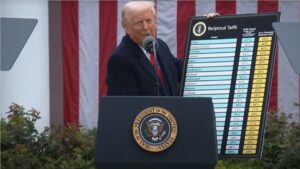I’ll be interviewing Will this Tuesday, for my radio show, Finding Fringe: Voices from the Edge, and it will air in July.
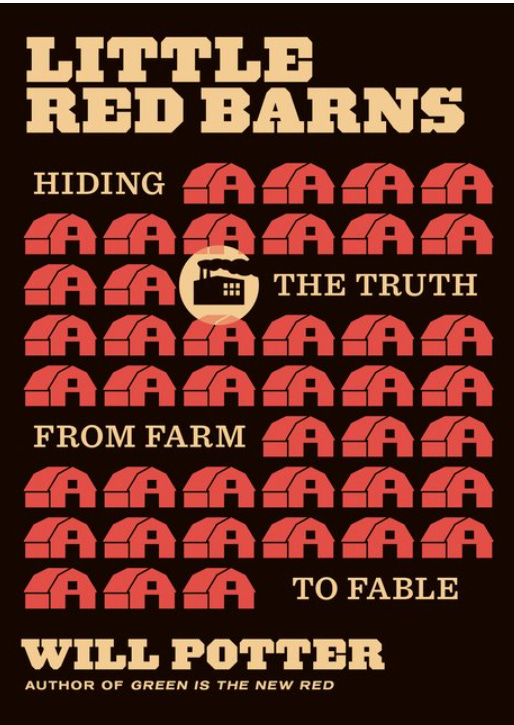
Here’s a blub — a promotional positive statement about the book:
“We are in a fight for our lives against a rising authoritarian tide, and this clear-eyed, compelling, clarion call of a book has a message everyone needs to hear. We will not save ourselves if we do not also fight for the lives of others–including non-human animals. No one is better positioned than Will Potter to connect the dots between fascism and factory farming, and he does so with energy, conviction, and incredible insight.”
— Astra Taylor, author of Democracy May Not Exist, but We’ll Miss It When It’s Gone
I’m digging the book he sent me. Stay TUNED.
Yes indeed, things have gotten really really worse, and the book thus far is about ag-gag, the history of those laws, and we go back farther than Upton Sinclair’s The Jungle, way back to “Old McDonald Had a Farm.” Even farther back to Matthew in that book about bearing witness, or Islam and the concept of being a martyr, witness, whistleblower.
Oh, I recall this bullshit interview/debate on Democracy Now with Will Potter and the schill goofy woman working for the lobby, man, and the manufactured balance, the false balance, the broken equivalency.

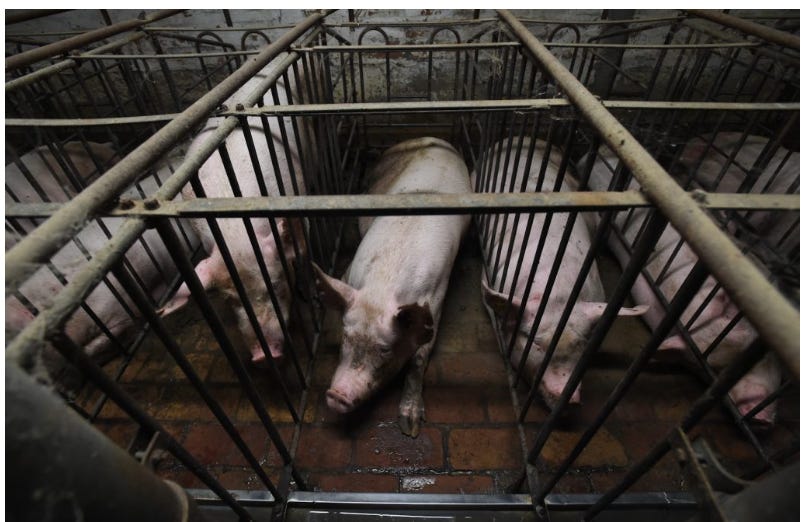
Thirteen Years ago: States Crack Down On Animal Rights Activists And Their Undercover Videos
My most recent radio interview about to hit the airways June 18, KYAQ.org, but DV and Paulokirk readers get the preview here: The right to community. And that is what the politicians and their thug dictators, the corporations, the polluters and the destroyers, want DESTROYED forever. The-Right-to/for/because of Community

So, moving on before I get back to reading Will’s new book, the infamy of AmeriKKKa and the world, as we slaughter not just the billions of birds and bovine and swine, but our fellow human beings.
Bearing witness? Goddamn!

Child Gunned Down by the IDF, His Crime? Being Born Palestinian: Israel is annihilating Palestinian children. Amer Rabee was one of them
Amer had a name. He had a smile. He was loved. He was real. And now, he is gone. We owe him more than silence. We owe Gaza’s starving children more than silence.
*****
I talk about this EVERYDAY — how do we go on without YELLING at the top of our lungs everywhere all the goddamn time?
[Palestine Will Be Free]
Oh, what great progress! We have come so far
What glorious days I wake up to!
What mirth and joy the mornings conjure.
After starting my day with coffee and Wagyu steak,
I tap-dance to work and present my deck.
All fun and games with the friends at work,
As we discuss last night’s game we streamed.
“Oh, how he shot — and the one he missed —
They should build him a statue in the city’s midst.”
At noon, I got the letter with the bonus check —
My hard work is really stacking the deck!
That called for a celebration, so we went
To this exquisite bar a colleague had picked.
We did good business this year, my boss said,
As our machines were deployed across the East and the West.
We’re ramping up production — the demand is high.
I already smell the next check — oh, how I fly!
We wrapped up another busy day at work,
As we built more machines to send across the pond.
On the way home, I called my spouse,
And we went to her favourite: Roundhouse.
As we got home, on the TV they showed
One of our products being dropped by the shore.
Our President announced, “No holds will be barred,
In support of our friends who always want more.”
Smacking my lips, I looked up the scrip,
Giddy as a kid, I slept like a pig.
More work tomorrow, as we must ship more
Of our fearsome products to our friends by the shore.
Oh, what great progress! We have come so far.
With my MIT degree, I have become a star.
My machines hum low as they cross the sea,
Carving silence where children used to be.
*****
More of the monsters, the criminals, the continuing criminal enterprises of finance and predatory and disaster and penury and polluting capitalism:
JPMorgan’s Jamie Dimon calls on US to stockpile bullets, rare earth instead of bitcoin!
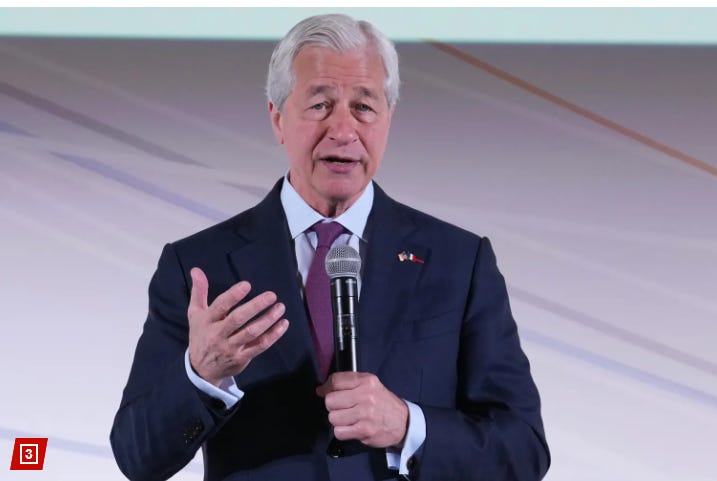
Crime boss in a 5,000 dollar suit:
“We should be stockpiling bullets,” he continued.
“Like, you know, the military guys tell you that, you know, if there’s a war in the South China Sea, we have missiles for seven days. Okay, come on. I mean, we can’t say that with a straight face and think that’s okay. So we know what to do. We just got to now go about doing it. Get the people together, roll up our sleeves, you know, have the debates.”
And so the clown show is so on track to take the USA down the path of intellectual-spiritual-agency starvation. No one in the NBC piece is railing against the military and the fool Trump, no-sir-ee.
Army says Trump’s military parade could cause $16 million in damage to Washington streets
The repair costs are part of the estimated $45 million price tag for the upcoming parade.

Bone spurs Trump, man, what a complete Chief Fraud.
“We have the greatest missiles in the world. We have the greatest submarines in the world. We have the greatest army tanks in the world. We have the greatest weapons in the world. And we’re going to celebrate it,” Trump added.
The parade will be part of a massive celebration in downtown Washington that includes a number of events, historical displays and a demonstration by the Army’s famous parachute team, the Golden Knights.
The parade itself will include about 130 vehicles, including 28 M1A1 tanks, 28 Bradley Fighting Vehicles, 28 Stryker armored fighting vehicles and a number of vehicles towing artillery launchers. More than 50 helicopters will also participate in an “extensive flyover” in the nation’s capital.
The event will also bring more than 9,000 soldiers from around the country to Washington, about 7,000 of whom will march in the parade itself. The event will also include at least eight Army bands, and some troops will ride on the nearly three dozen horses and two mules expected to march as part of a historical section of the parade.
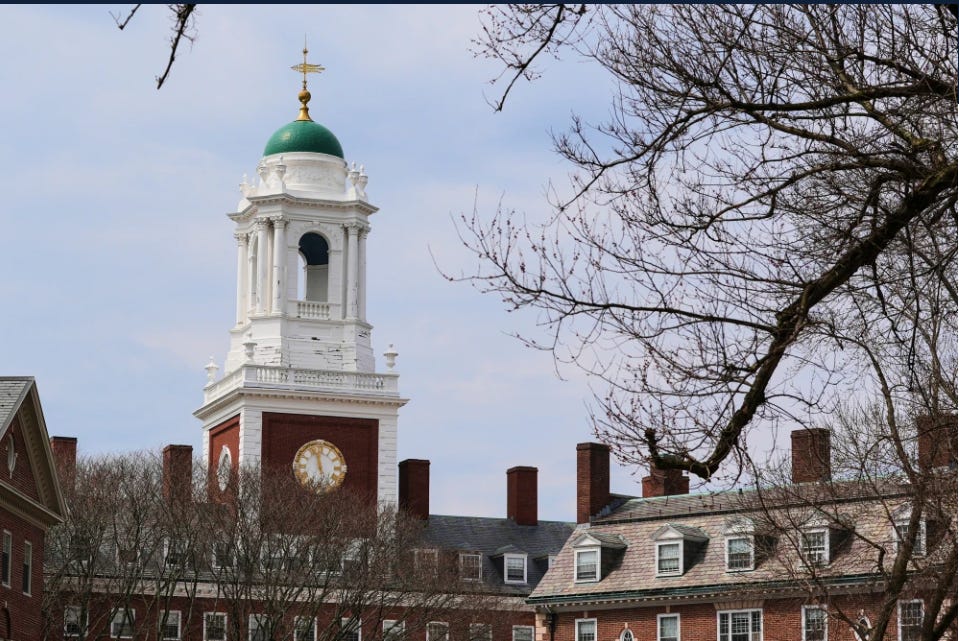
[Photo: Poison Ivy League school Harvard!]
And you thought colleges were places of sanity and caring? Forget about it.
As colleges halt affinity graduations, students of color plan their own cultural celebrations. Affinity graduations recognize the range “of challenges and obstacles” that students from minority backgrounds face as they work toward their degrees, said one professor.
Death spiral in almost 100 percent of American life:
The Harvard joins many other institutions across the country that have canceled affinity graduations after the federal cracked down on funding for colleges. Notre Dame canceled its Lavender Graduation for 50 LGBTQ students, with members of the university’s Alumni Rainbow Community and the Notre Dame Club of Greater Louisville stepping in to host an independent ceremony this month.
Wichita State University, the University of Louisville and the University of Kentucky also canceled some or all of their affinity ceremonies. The Hispanic Educators Association of Nevada said it canceled its event for Latino students because of a lack of financial support.

This is what education once again means to the perversions called US Secretary of Ed.
U.S. Secretary of Education Linda McMahon said her department will give the state ten days to sign an agreement rescinding its Native American mascot ban and apologizing to Native Americans for having discriminated against them and attempted to “erase” their history.
JP O’Hare, a spokesperson for the New York education department, dismissed McMahon’s visit as “political theater” and said the school district was doing a “grave disservice” to its students by refusing to consult with local tribes about their concerns.
“These representatives will tell them, as they have told us, that certain Native American names and images perpetuate negative stereotypes and are demonstrably harmful to children,” he said in a statement.
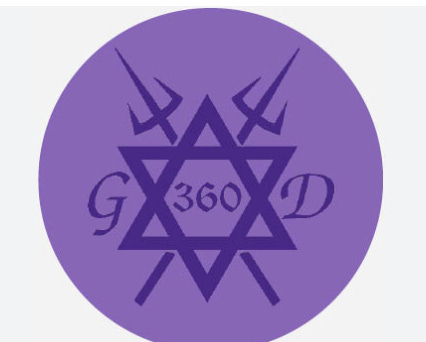
You feeling the dictator’s blues yet? President Trump has long called for escalating the U.S. drug war against Mexican cartels and wants tougher penalties for dealers selling fentanyl and other street drugs in American communities. “I am ready for it, the death penalty, if you deal drugs,” Trump said during a meeting with state governors in February, where he said dealers are too often treated with a “slap on the wrist.”
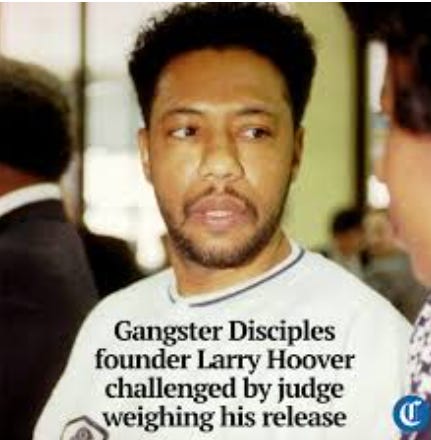
But despite his tough rhetoric, Trump has sparked controversy by pardoning a growing number of convicted drug dealers, including this week’s move to grant clemency to Larry Hoover, 74, who was serving multiple life sentences in federal prison for crimes linked to his role leading the Chicago-based Gangster Disciples.
“Larry Hoover was the head of perhaps the most pernicious, efficient drug operation in the United States,” Safer said. “They sold over $100 million of drugs a year in the city of Chicago alone. They were responsible for countless murders. They supported their drug territories with ruthless violence.”
*****
A LITTLE pushback?
What? Everything about Trump, man, is the most perverse, weird and dystopian and of course, Snake Oil Salesmanship and Three Card Monty and Chapter 11-13 full bore.
Not digging the Catholic Church, but can you imagine making rabbis tell the truth, the Fortune 300 or 5,000 go before a board of truth and reconciliation? Imagine if the Jewish State of Murdering Raping Maiming Polluting Poisoning Starving Occupied Palestine had to disclose that client-extortionist privilege? Patient-Doctor confidentiality? Doesn’t exist, and DOGE is coming after the food stampers and the disability pittance recipients while the millionaires, billionaires and trillionaires get to keep their dirty felonious secrets, well, secrets.

The sickness throughout the land, as Flag Day and Rapist in CHief’s B-Day and the Military Uniformed Mercenary Hired Guns Army have their anniversary, and we continue writing at Dissident Voice and elsewhere the crimes, man, the inhumanity, the absolute Orwellian and Phillip K. Dick nature of this dystopia.
*****
Some of us are tired of surviving
For many in Gaza, death isn’t always the worst outcome.
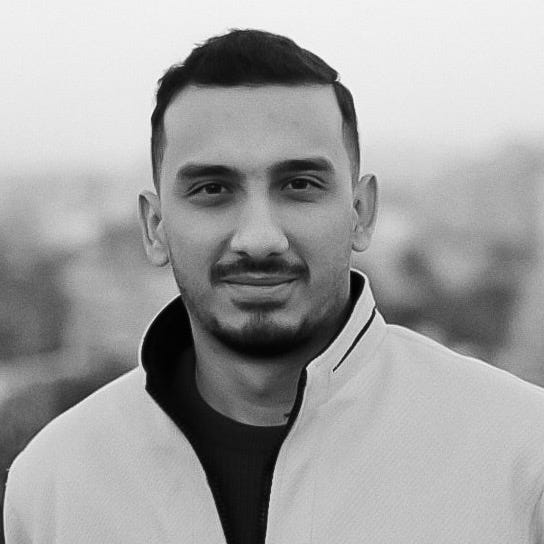
May 31, 2025
What kind of world forces people to beg for death to feel peace?
I’ve survived so many times now I’ve lost count. I was pulled from the rubble with my son after our home was flattened, walked for hours carrying a bag of bread and the bones of what once was a life, fled neighborhoods, towns, and streets we once called home, only to find no home waiting on the other side, and every time I survived, something else died. Sometimes, it was a friend. Sometimes a cousin and sometimes a colleague. Some other times it was the sound of my son’s laughter and my own belief that living means something.
Survival is not a blessing.
I’ve come to learn that survival is just another word for staying inside the pain. People wake up every day in a different place than where they were yesterday and find it more crowded and more tired and more broken. Stepping over children sleeping on cardboard under trees is now a normal thing, and the days are all the same. So are the struggles of hunger and water and the bitter metallic taste. The same questions about where we should go next, what we will eat today, and who else we’ve lost.
A reporter captured the moment at midnight, as the sky lit up like day from illumination flares.
The caption reads: “We are dying. The Israeli bombing is relentless. Women and children are the victims. No safe places left. No food, no water. Famine is spreading rapidly.”
I’ve sat with people who don’t run anymore when leaflets fall from the sky, I remember talking to a woman in Khan Younis who told me she stayed in her home after the first warnings. Her name was Sameera and she was sixty-two. Her husband was too sick to walk and she couldn’t carry him. “If we leave, we die on the road. If we stay, we die here,” she said. “At least here I know the ground. I know which walls will fall on me.”
She didn’t say it with fear. There was simply no fear left.
Another man in Deir Al Balah was standing in the middle of a bombed street and sweeping glass and dirt into a pile. He’d lost two of his daughters, and when I asked him why he didn’t leave earlier, he said, “I didn’t want to spend the last moments of my life running.”
It’s neither courage nor resistance, only exhaustion, the kind that comes with an understanding that in Gaza there is no such thing as a safe place. We just run until our legs and souls give out. And even if we make it out alive, we still carry the weight of every person who didn’t.
In one video, a child sits on top of the rubble sobbing. His father is still trapped beneath the debris.]
People always say survival is the goal and we’re lucky to have made it. But there’s no such thing as luck about people dissolving slowly and dying in slow motion.
During my months reporting from there, I saw children who don’t speak anymore. I once saw a boy in Jabalia who used to love cartoons but now just sits and stares at the wall. When I tried to ask for his name, he covered his ears. His mother said he hasn’t spoken since the missile hit their home and took his sister.
When someone cries out of an injury, we know they’re still holding on. But when they just stare at the ceiling as they bleed, we know they’ve already left, even if their body hasn’t.
There is nothing noble about this kind of survival. There is no aftercare or healing.
A young Palestinian student, Shayma, describes what it’s like to be forcibly displaced amid the devastation and having nowhere to go. The camera pans across the flattened neighborhood where she is sheltering. aljazeeraenglish
We don’t want to die. But when some of us fantasize about death, it’s because we’re full of everything that hurts. Our moms whisper that they envy those who died peacefully and quickly. I myself used to shower in cold water at night just to feel something cold. My neighbor lost her baby to dehydration around the time my son and I were diagnosed with malnutrition in March 2024. She still carries his blanket in her bag.
And here my friends tell me to stay strong and safe. But I don’t want strength anymore. I don’t want to be the one who survived everything. I don’t want my son to grow up believing that pain is something you get used to or that losing everything and still breathing means you’re lucky.
We all have our tricks for trying to suffer a little less. Some stop talking about the people they lost because even saying a name is unbearable. Some lie to themselves and pretend their loved ones are still displaced just somewhere they can’t reach. Some stop eating because food feels like a betrayal when the person you used to share it with is gone.
I once believed that writing would help me make sense of it and that putting these stories down would somehow soften them. But even that doesn’t work anymore. I can’t keep writing about mass graves and call it documenting and narrating pain while still living inside it.
There is nothing poetic about this grief. It is ugly and it is heavy and it is repetitive. Sometimes I walk for hours just not to think and keep my body moving while my mind shuts down, or just to delay the next memory from arriving.
I still wake up sometimes believing we’re back home and feel like I’ll hear my mother’s voice and make coffee in our old kitchen.
The truth is, survival, when it’s endless and hollow and filled with nothing but hunger and mourning and fear… it begins to feel like a punishment.
We are alive in ways no one in this world would envy.
So when the people in Gaza no longer pray for safety, it’s because we’ve seen too much and lost too many.
The post Ahh, Little Red Barns Don’t Exist Anymore, Israel Was Never a Democracy, and Neither US the Shining City on the Hill first appeared on Dissident Voice.
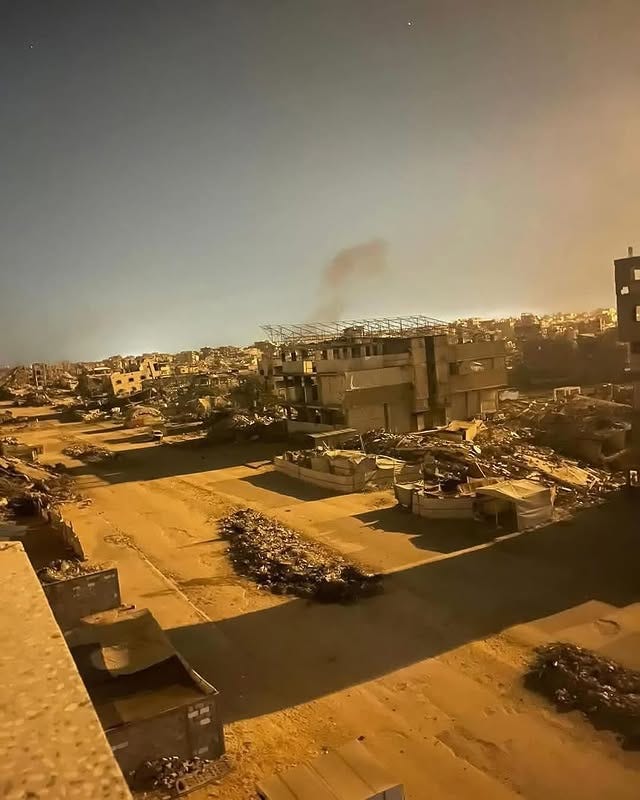

 Israel’s claim that Hamas is “stealing aid” is so preposterous no serious journalist or politician ought to give it any kind of airing – yet there it is continuously cropping up in the coverage of Gaza.
Israel’s claim that Hamas is “stealing aid” is so preposterous no serious journalist or politician ought to give it any kind of airing – yet there it is continuously cropping up in the coverage of Gaza.



